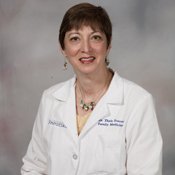Ever since she was a young girl, Thais Tonore wanted to be a doctor. She says her mother and friends remember her talking about it in junior high and high school. Her dream came true in 1978 when she earned her medical degree at the University of Mississippi Medical Center, where she works today.
Dr. Tonore, a Madison resident for more than 30 years, has been a family doctor since 1981 and on the American Board of Family Practice five times.
Before joining the staff of UMMC in 1999, she was in private practice in the Ridgeland area. At the center, she is a professor and the director of student programs, where she coordinates the interactions of medical students with the Department of Family Medicine.
This year, Tonore will be a mentor for the new Primary Care Leadership Program, which the GE Foundation's National Medical Fellowship funds. PLCP pilot programs will take place in four U.S. cities: Los Angeles, Phoenix, Nashville and Jackson. Six students in Jackson will receive 200 hours of primary-care experience at the Jackson-Hinds Comprehensive Health Center or the Robert Smith Community Health Center.
"Primary care is a specialty that takes care of the general problems of a patient from birth to death; all ages and all systems of the body are covered," Tonore explains.
As a mentor, she will meet with the students weekly to discuss their experiences and progress, and she will oversee a preventive-medicine project the students will complete. Tonore says she will also "conduct a teaching session that will be put on a podcast to the students all over the country in this program."
PLCP exists because the United States is experiencing a shortage of primary-care physicians, not only in the program's four cities, but throughout the nation. Tonore believes this may be attributable to medical-school student-loan debt; it can take students longer to pay off debt as primary-care doctors than it would as specialists. However, she stresses the importance of Mississippi's medical students to choose work in primary care.
"It is the type of specialty we need in all the communities in Mississippi, whereas a subspecialty of medicine might not have enough support in a small community for a person to practice there," she says.



Comments
Use the comment form below to begin a discussion about this content.